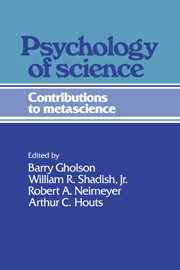Book contents
- Frontmatter
- Contents
- Preface
- Contributors
- 1 The psychology of science: An introduction
- Part I Historical issues in the psychology of science
- Part II The case for a psychology of science
- Part III Creativity and the psychology of science
- Part IV Cognition in the psychology of science
- Part V Social factors in the psychology of science
- Part VI Epilogue and Prologue
- Author index
- Subject index
Part I - Historical issues in the psychology of science
Historical analyses of the psychology of science
Published online by Cambridge University Press: 05 June 2012
- Frontmatter
- Contents
- Preface
- Contributors
- 1 The psychology of science: An introduction
- Part I Historical issues in the psychology of science
- Part II The case for a psychology of science
- Part III Creativity and the psychology of science
- Part IV Cognition in the psychology of science
- Part V Social factors in the psychology of science
- Part VI Epilogue and Prologue
- Author index
- Subject index
Summary
The first part of the book contains two chapters that discuss the history of the psychology of science. It seems odd to be discussing the history of a specialty that we previously suggested may not yet exist in any organized sense. Yet the psychology of science has historical roots not only in the parent discipline of psychology but also in philosophy, history, and sociology of science. We become educated and informed about these roots, and about the important issues to which they give rise for psychologists, by studying that history. History teaches us about important accomplishments and controversies that might involve psychologists, about paths to pursue and blind alleys to avoid, and about the kind of reception psychologists can expect to receive from other scholars of science. Perhaps as important, history teaches us a sense of humility about our place in the larger scheme of science studies by reminding us of the critical contributions made to psychology of science by its early pioneers.
One of those pioneers is Donald T. Campbell (1950, 1959), a psychologist who is particularly well suited to teach us our history. In the first chapter in this section, Campbell avers that he is only alluding to a possible history that someone else may eventually write. But this typical modesty on his part is belied by the breadth of material that he taps.
- Type
- Chapter
- Information
- Psychology of ScienceContributions to Metascience, pp. 17 - 20Publisher: Cambridge University PressPrint publication year: 1989



